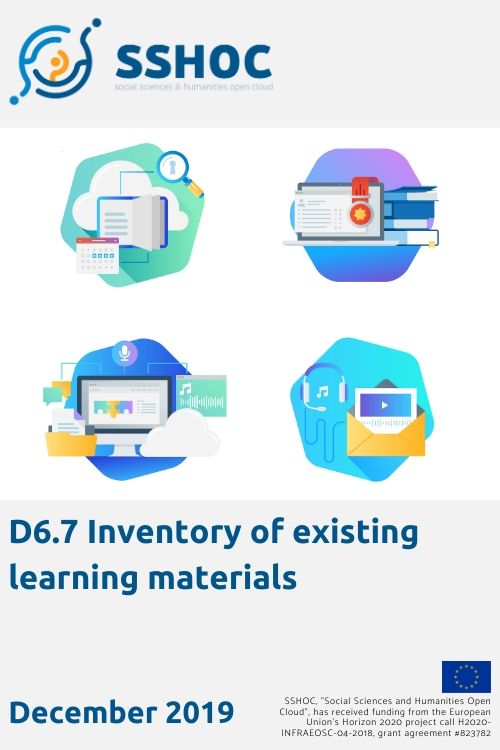
- Social Sciences & Humanities Open Cloud
D6.7 Inventory of existing learning materials

Submission date:
18 December 2019
This report gives an overview of the landscape of training material in the SSH disciplines cluster and the broader context of EOSC based on inspecting main existing sources of training materials and their content. The collected information serves as input for further activities in WP6 as well as an important source of information for WP7.
For planning further activities in WP6 - Fostering Communities, Empowering Users, & Building Expertise as well as input for the development of the SSH Open Marketplace in WP7- Creating the SSH Open Marketplace it is indispensable to survey the current landscape of existing training materials in the SSH cluster as well as in the broader context of EOSC. Numerous similar activities have been performed in various recent EOSC- and FAIR- related projects and these have served as partial input while compiling this inventory.
Around 30 sources of training material of various kinds and scopes have been gathered initially. These were analysed along with a number of dimensions, like intended audience, relevant discipline, topics covered, extent, status etc. Additionally, for most of the sources, a few individual training material items were picked and described in further detail. All this information has been collected through a dedicated Drupal-based application. The collected information is not exhausting, but it should provide a sufficient probe into the training materials landscape to inform further actions.
Particularly it reveals the following findings:
- There seems to be a host of material on Research Data Management and application of FAIR principles, as well as on basic scripting skills for Data Science, i.e. working with the shell, programming with Python/R, for purposes of automatically processing data.
- We can distinguish four types of training materials: e-learning courses, carpentry-style, blog-style, static (slides, videos, PDFs)
- There are numerous sources that seem to be abandoned or in danger of becoming obsolete.
- There is little to none harmonisation with respect to metadata about the training material. This information is seldom available in structured and automatically harvestable form. The findings imply the following recommendations for further work in WP6 and WP7:
- Perform a gap analysis on the topic coverage combined with the set of topics which could be provided by the individual WPs of the project
- Reserve sufficient capacities for the manual curation of existing sources, defining metadata and communicating with the providers. Start as soon as possible.
This deliverable has been accepted by the European Commission on - 03 November 2020
Publication type:
Deliverable
Catalogue:
SSH Training Discovery Toolkit
